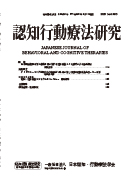Current issue
Displaying 1-6 of 6 articles from this issue
- |<
- <
- 1
- >
- >|
Original Article
-
2023 Volume 49 Issue 3 Pages 111-123
Published: September 30, 2023
Released on J-STAGE: February 17, 2024
Advance online publication: November 24, 2023Download PDF (658K)
Practical Research
-
2023 Volume 49 Issue 3 Pages 125-134
Published: September 30, 2023
Released on J-STAGE: February 17, 2024
Advance online publication: June 23, 2023Download PDF (546K)
Report
-
2023 Volume 49 Issue 3 Pages 135-137
Published: September 30, 2023
Released on J-STAGE: February 17, 2024
Download PDF (238K)
-
2023 Volume 49 Issue 3 Pages 139-140
Published: September 30, 2023
Released on J-STAGE: February 17, 2024
Download PDF (262K) -
2023 Volume 49 Issue 3 Pages 141-142
Published: September 30, 2023
Released on J-STAGE: February 17, 2024
Download PDF (234K) -
2023 Volume 49 Issue 3 Pages 143-144
Published: September 30, 2023
Released on J-STAGE: February 17, 2024
Download PDF (260K)
- |<
- <
- 1
- >
- >|
